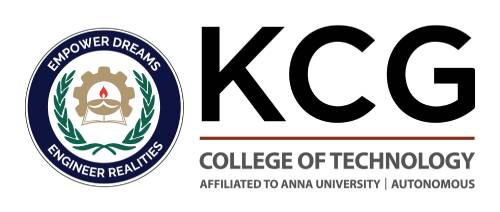Revolutionizing Healthcare: Robotics Engineering Solutions for Medical Challenges
In recent years, the convergence of robotics and healthcare has ushered in a new era of innovation, promising transformative solutions to some of the most pressing medical challenges. From assisting in surgeries to automating repetitive tasks, robotics is revolutionizing the way healthcare is delivered. At KCG College of Technology, we recognize the immense potential of robotics in healthcare and are committed to equipping our students with the skills and knowledge needed to drive this revolution forward.
The Role of Robotics in Healthcare:
Robots are increasingly being deployed in various healthcare settings to perform a wide range of tasks, including:
● Surgical Assistance: One of the most notable applications of robotics in healthcare is in the field of surgery. Robotic surgical systems offer enhanced precision, dexterity, and control, allowing surgeons to perform complex procedures with greater accuracy and minimal invasiveness. These systems enable surgeons to access hard-to-reach areas of the body with precision, resulting in faster recovery times and better patient outcomes.
● Rehabilitation and Therapy: Robotics is also playing a crucial role in rehabilitation and therapy. Robotic exoskeletons and assistive devices help patients regain mobility and independence following injuries or surgeries. These devices provide personalized therapy programs and real-time feedback, enabling patients to achieve optimal recovery outcomes.
● Diagnostic and Imaging: Robotics is being utilized to enhance diagnostic and imaging procedures in healthcare. Robotic systems can assist radiologists in performing more accurate and efficient imaging scans, leading to earlier detection of diseases and improved treatment planning. Additionally, robots equipped with sensors and cameras can navigate inside the body to perform minimally invasive diagnostic procedures with precision.
Engineering Solutions for Medical Challenges:
The integration of engineering principles with robotics has led to the development of innovative solutions for addressing various medical challenges:
● Miniaturization and Precision: Engineers are constantly striving to miniaturize robotic systems and enhance their precision to enable minimally invasive procedures. This involves the design and development of smaller and more agile robots capable of navigating intricate anatomical structures with precision.
● Artificial Intelligence and Machine Learning: The incorporation of artificial intelligence (AI) and machine learning algorithms enables robots to learn from experience and adapt to changing environments. AI-powered robotics systems can analyze vast amounts of medical data to assist healthcare professionals in making more informed decisions and predicting patient outcomes.
● Human-Robot Interaction: Engineers are focusing on improving the interaction between humans and robots to enhance collaboration and efficiency in healthcare settings. This involves designing intuitive user interfaces, developing natural language processing capabilities, and ensuring safe and seamless integration of robots into existing workflows.
As technology continues to advance, the future of robotics in healthcare holds immense promise. From personalized medicine to remote patient monitoring, robotics is poised to revolutionize every aspect of healthcare delivery. At KCG College of Technology, we are at the forefront of this revolution, preparing the next generation of engineers to harness the power of robotics to address the evolving needs of the healthcare industry.








